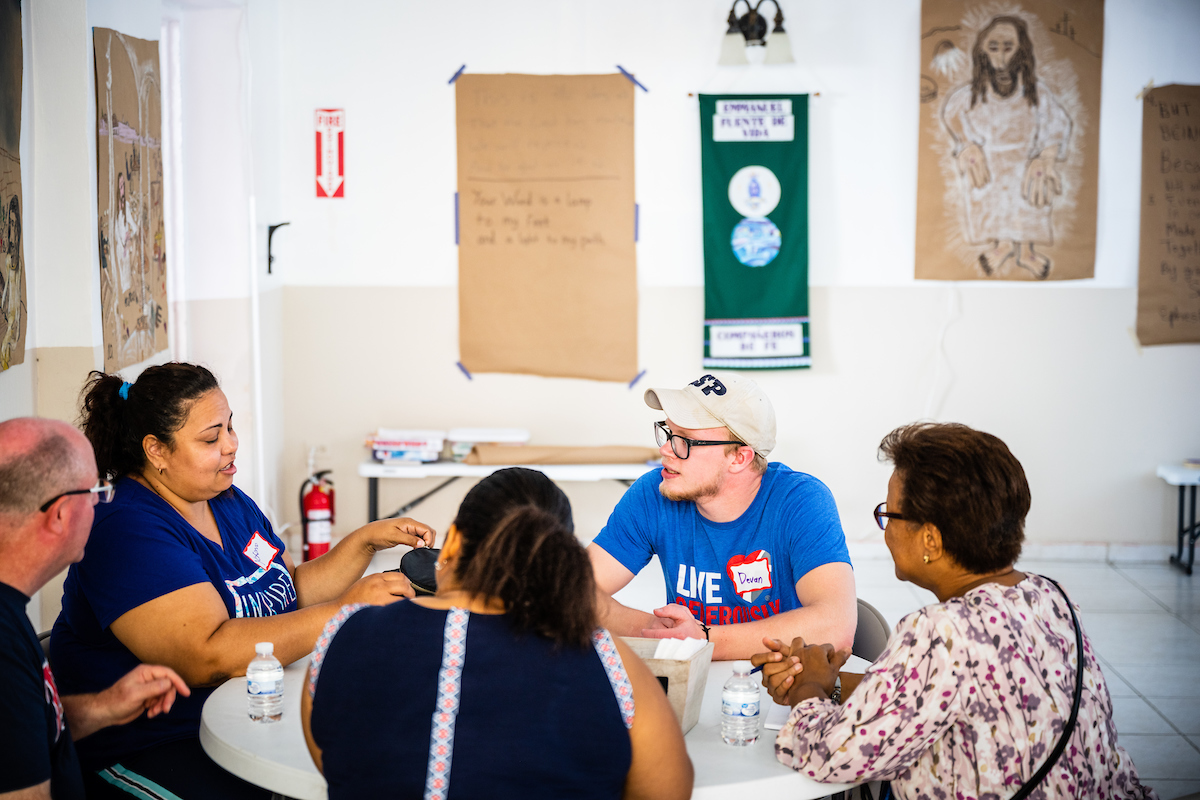
The LCMS Office of International Mission has been partnering with our missionaries to provide volunteer support to ongoing English-based outreach efforts. This has come in the form of Zoom-based English conversation partners. The following tips are based on one missionary’s experience hosting an online conversation group, but most can be applied in any English conversation partner setting.
By Alyssa Anders
Your Purpose
Knowing what your purpose is will help to guide you in your role as a language partner. You are here to 1) support the local ministry, and 2) help someone practice their English skills.
Your role as conversation partner will help to connect the local missionary and the local church to people in the community. Often, the only opportunity you will have to share your faith during a lesson is by explaining that you are a Christian and were connected to this program through the local missionary. Your language partner may ask for more information, or they may not. It may be appropriate to refer to your faith at some point in the discussion, or it may not.
But regardless of what testimony you are able to give through words, remember that your attitude and behavior are a witness to your faith. Your partner will probably remember you and use you as an example to all of his friends and family of what an American Christian is like. Like it or not, you are representing your faith and your culture to these people.
You are not here to teach a lesson or correct their grammar. You are a language partner. Be willing to listen to them and be willing to share your own experiences. You are basically agreeing to join in a guided conversation with another person or group of people — be ready to do that!
Tips and Tricks
Be prepared
Read through the materials provided by your host. Email them your questions ahead of time and don’t wait until the last minute to familiarize yourself with the lesson. Also familiarize yourself with the software you’ll be using, so when the time comes you are comfortable using the different features.
Simplify your language
We often don’t realize how often we use idioms or slang in our speech. Try to listen to yourself and avoid such expressions when talking to the students. Phrases such as “raining cats and dogs,” “by the skin of my teeth,” “going the extra mile,” “opening a can of worms,” etc., don’t translate literally and might be very confusing to your language partner.
Rephrase
If a student doesn’t understand something the first time, try rephrasing it.
Take a moment now to practice. Think of three other ways to ask this question: “Have you ever lost your way when hiking in the woods before?”

Scenarios
Scenario One: Your partner has an extremely low level of English.
You sign on, and the face on the other screen smiles a little timidly, and after a few attempts at conversation, it’s clear that they’re not following your English. What do you do?
Pray.
Try speaking slower and more clearly. Often English language learners have never heard English spoken with an actual American accent. That throws them off initially.
Choose simpler words and verb tenses.
Try writing your questions in the chat box.
Ask simple get-to-know-you questions. Usually students have rehearsed this vocabulary a lot, so they’re familiar with it and it can help them to ease into a conversation. Questions about their name, job/school, family, hobbies, favorite foods and colors are a great place to start.
Contact the host using the “ask for help” button.
Get creative! Point to things around your room, show pictures, read from the Bible or another book, use gestures and body language.
Scenario Two: Your partner asks a question that you don’t want to answer.
You get started with the conversation and everything is going well. Your partner speaks English well, and you’re having a really great conversation. Until they ask you what you think about President Trump. You know their country and the USA are at odds politically right now, and this isn’t really a topic you want to get into. What do you do?
Pray.
I can’t tell you how many times this has happened to me. Students ask about my marital status, my opinion of the local culture, my opinion of American politics. I have even had students ask me about my weight. In class.
Remember, these questions are probably not acceptable in polite society in their own culture. They’re asking you because they think the rules are different. They’re not. Make a polite excuse and redirect the conversation to another topic.
Scenario Three: Your student is making a lot of mistakes, although you understand what they are saying.
You get into your conversation and start to realize that your partner is making a lot of simple grammar mistakes, and they are making them repeatedly. At the same time, however, you’re able to follow their train of thought and their mistakes aren’t interfering with meaning. Should you stop and correct them?
Pray.
You are here to be a language partner, not a language teacher. Not every mistake needs to be corrected and you don’t always have to jump in to help when your partner is struggling with a word. The best thing to do is to ask the student what their preference is. Some people like to have all of their mistakes corrected — that’s how they learn. Others just want someone to talk to. They’re happy that their meaning is coming across, and they don’t care how many mistakes they make along the way. Sometimes people want to have the time to think of words themselves, and other people want you to help them out. So just ask!
Serving Your Neighbor
This opportunity is about service. It’s about giving your time and your focus to people you’ve never met and who live in completely different contexts than you. And service is hard. Even though you don’t have to leave your home, talking to a conversation partner will probably put you out of your comfort zone. You will have to sacrifice to make this time slot a priority and to make sure that you’re prepared for each lesson.
So why do we serve? Take a minute to think about what is motivating you to join this program. There are a lot of good reasons to serve, but above everything else we should keep in mind that we serve because God served us. He gives us new life, and in the joy of that new life we are able to serve others.
I hope you enjoy your conversation partner adventure!
Alyssa Anders serves alongside a partner church in Eurasia. Trained as an English teacher, Alyssa assists the work of the church by equipping the ministers, workers and members of this church body with English language skills. She graduated with a bachelor’s degree in history from Thomas Edison State College, Trenton, N.J., and a master’s degree in Teaching English to Speakers of Other Languages (TESOL) from Eastern Michigan University, Ypsilanti. She has been involved with teaching English as a Second Language for about 10 years, and her interest in serving others through teaching has taken her around the world.